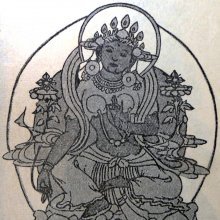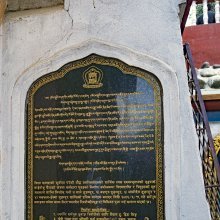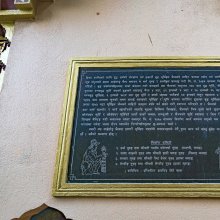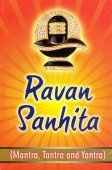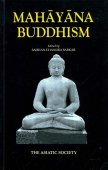Karma, Karman, Kārma: 57 definitions
Introduction:
Karma means something in Buddhism, Pali, Hinduism, Sanskrit, Jainism, Prakrit, the history of ancient India, Marathi, biology. If you want to know the exact meaning, history, etymology or English translation of this term then check out the descriptions on this page. Add your comment or reference to a book if you want to contribute to this summary article.
Images (photo gallery)
In Hinduism
Vaisheshika (school of philosophy)
Source: Wisdom Library: VaiśeṣikaKarma (कर्म, “activity”) is one of the seven accepted categories of padārtha (“metaphysical correlate”), according to the Vaiśeṣika-sūtras. These padārthas represent everything that exists which can be cognized and named. Together with their subdivisions, they attempt to explain the nature of the universe and the existence of living beings.
Source: Wikipedia: VaisheshikaKarma (कर्म, “activity”): The karmas (activities) like guṇas (qualities) have no separate existence, they belong to the substances (according to the Vaiśeṣika school). But while a quality is a permanent feature of a substance, an activity is a transient one. Ākāśa (ether), kāla (time), dik (space) and ātman (self), though substances, are devoid of karma (activity).

Vaisheshika (वैशेषिक, vaiśeṣika) refers to a school of orthodox Hindu philosophy (astika), drawing its subject-matter from the Upanishads. Vaisheshika deals with subjects such as logic, epistemology, philosophy and expounds concepts similar to Buddhism in nature
Dharmashastra (religious law)
Source: Google Books: Studies in Hindu Law and DharmaśāstraManu first lists (Manu-smṛti 10.75) the six acitivities (karman) of the Brāhmaṇa:
- Teach (adhyāpana),
- studying (adhyayana),
- performing his own sacrifices (yajana),
- performing sacrifices for others (yājana),
- giving gifts (dāna),
- receiving gifts (pratigraha)
these are the six activities of a Brāhmaṇa.

Dharmashastra (धर्मशास्त्र, dharmaśāstra) contains the instructions (shastra) regarding religious conduct of livelihood (dharma), ceremonies, jurisprudence (study of law) and more. It is categorized as smriti, an important and authoritative selection of books dealing with the Hindu lifestyle.
Ayurveda (science of life)
Source: Wisdom Library: Āyurveda and botanyKarma (कर्म, “action”):—One of the six padārtha (or ‘basic categories’) which should be known to every Physician if he wants to understand the science of life.
Source: Google Books: Essentials of AyurvedaKarma (कर्म) is defined as the cause of conjunction and disjunction and residing in dravya. It begins with effort and appears in movements of living tissues and organs.
Source: gurumukhi.ru: Ayurveda glossary of terms1) Karma (कर्म):—Action; mainly pharmacological action arising out of breakdown & resynthesis at the mahabhautika level;
2) 1. one among the six causative factors which resides in substance and responsible for pharmacological action 2. efforts done by body senses and mind
Source: National Mission for Manuscripts: Traditional Medicine System in IndiaKarma (कर्म) refers to “targeted action of a drug” and represents one of the six divisions of dravya (drugs).—The drug/dravya, if is properly used it is equivalent to amṛta (nectar) and if improperly used it is like viṣa (poison). According to Āyurveda, dravya or drug is comprised of rasa (taste), guṇa (properties and qualities), vīrya (potency), vipāka (post-digestive-taste), prabhāva (serendipity—specific effect of a drug) and karma (targeted action of a drug).
Karmas is what these drugs do in the body. Fifty karmas are mentioned by Caraka and twenty-two by Śārṅgadhara. Karma in pharmcotherapeutics is the targeted action of a drug and it includes pharmacokinetics and pharmacodynamics.

Āyurveda (आयुर्वेद, ayurveda) is a branch of Indian science dealing with medicine, herbalism, taxology, anatomy, surgery, alchemy and related topics. Traditional practice of Āyurveda in ancient India dates back to at least the first millenium BC. Literature is commonly written in Sanskrit using various poetic metres.
Purana and Itihasa (epic history)
Source: archive.org: Shiva Purana - English TranslationKarma (कर्म) refers to the “activities” that are carried on by the body (śārira), as defined in the Śivapurāṇa 1.18. Accordingly, “[...] the body (śārira) carries on activities (karma). The activities generate the body. Thus birth and activities continue in a series. The body is of three types: the gross (sthūla), the subtle (sūkṣma) and the causal (kāraṇa). The gross body is responsible for all activities (karma); the subtle body yields the enjoyment of pleasures through the senses. The causal body is for the sake of experiencing the good and bad results of the activities (karma) of the Jiva. The Jīva experiences happiness as a result of virtue and misery as a result of sin. The Jīva bound by the rope of activities (karmarajju) revolves round and round for ever like a wheel (cakra) by means of the three types of body and their activities (karma).”.
Source: Cologne Digital Sanskrit Dictionaries: The Purana Index1a) Karma (कर्म).—Two-fold; pravṛtti and nivṛtti;1 importance of;2 that which consists of yajña is best.3
1b) (Vedic) two-fold; pravṛtta and nivṛtta.1 There is another classification of Karma: vaidika, tāntrika, and miśra (mixed).2 Kṛṣṇa advised Uddhava to pursue nivṛtta and abandon pravṛtta path.3 Karma exalted as the source of all good and evil, and appropriate to four castes: is done due to māyāmohan;4 does not lead to final destruction of karman.5 Seven-fold: tapas, brahmacarya, yajña, prajā, śrāddha, vidyā and dāna. Bad karma—five-fold: killing, theft, injury, drinking and lust.6 karma with Agni is kāmya, naimittika and ajasra; should be done with detachment.7 Rebirth after death is dependent on.8
- 1) Bhāgavata-purāṇa VII. 15. 47-49.
- 2) Ib. XI. 27. 7.
- 3) Ib. XI. 10. 4.
- 4) Ib. X. 23. 50; 24. 13-14 & 18-20.
- 5) Ib. VI. 1. 11.
- 6) Brahmāṇḍa-purāṇa II. 28. 75; III. 4. 5 & 24; 28. 9; IV. 5. 25; 6. 37; Vāyu-purāṇa 56. 70.
- 7) Vāyu-purāṇa 29. 44; 104. 86-96.
- 8) Vāyu-purāṇa 14. 2-3, 31-42; 61. 106.

The Purana (पुराण, purāṇas) refers to Sanskrit literature preserving ancient India’s vast cultural history, including historical legends, religious ceremonies, various arts and sciences. The eighteen mahapuranas total over 400,000 shlokas (metrical couplets) and date to at least several centuries BCE.
Vyakarana (Sanskrit grammar)
Source: Shodhganga: Vaiyākaraṇabhūṣaṇasāra: a critical studyKarman (कर्मन्).—Object of a transitive verb defined as something which the agent or the doer of an action wants primarily to achieve. It is described to be of three kinds with reference to the way in which it is obtained from the activity. 1. Vikārya, when a transformation or change is noticed in the object as a result of the verbal activity. 2. Prāpya, the object in which no change is seen by the action of the subject. 3. Nirvartya, when the object is brought into being under a specific name.
Source: Wikisource: A dictionary of Sanskrit grammarKarman (कर्मन्).—(l) object of a transitive verb, defined as something which the agent or the doer of an action wants primarily to achieve. The main feature of कर्मन् (karman) is that it is put in the accusative case; cf. कर्तुरीप्सिततमं कर्म, कर्मणि द्वितीया (karturīpsitatamaṃ karma, karmaṇi dvitīyā); P. I.4.49; II.3.2. Pāṇini has made कर्म (karma) a technical term and called all such words 'karman' as are connected with a verbal activity and used in the accusative case; cf. कर्तुरीप्सिततमं कर्म (karturīpsitatamaṃ karma); तथायुक्तं चानीप्सितम् (tathāyuktaṃ cānīpsitam) ; अकथितं च (akathitaṃ ca) and गतिबुद्धिप्रत्यवसानार्थशब्दकर्माकर्मकाणामणि कर्ता स णौ (gatibuddhipratyavasānārthaśabdakarmākarmakāṇāmaṇi kartā sa ṇau) P.I.4.49-52;cf also यत् क्रियते तत् कर्म (yat kriyate tat karma) Kāt. II.4.13, कर्त्राप्यम् (kartrāpyam) Jain I. 2. 120 and कर्तुर्व्याप्यं कर्म (karturvyāpyaṃ karma) Hem. II. 2. 3. Sometimes a kāraka, related to the activity (क्रिया (kriyā)) as saṃpradāna, apādāna or adhikaraṇa is also treated as karma, if it is not meant or desired as apādāna,saṃpradāna etc. It is termed अकथितकर्म (akathitakarma) in such cases; cf. अपादानादिविशेषकथाभिरविवक्षितमकथितम् (apādānādiviśeṣakathābhiravivakṣitamakathitam) Kāś. on I.4.51. See the word अकथित (akathita) above. Karman or object is to be achieved by an activity or क्रिया (kriyā); it is always syntactically connected with a verb or a verbal derivative.When connected with verbs or verbal derivatives indeclinables or words ending with the affixes उक, क्त, क्तवतु, तृन् (uka, kta, ktavatu, tṛn), etc, it is put in the accusative case. It is put in the genitive case when it is connected with affixes other than those mentioned above; cf. P, II.3.65, 69. When, however, the karman is expressed (अभिहित (abhihita)) by a verbal termination (तिङ् (tiṅ)), or a verbal noun termination (कृत् (kṛt)), or a nounaffix (तद्धित (taddhita)), or a compound, it is put in the nominative case. e.g. कटः क्रियते, कटः कृतः, शत्यः, प्राप्तोदकः ग्रामः (kaṭaḥ kriyate, kaṭaḥ kṛtaḥ, śatyaḥ, prāptodakaḥ grāmaḥ) etc. It is called अभिहित (abhihita) in such cases;cf. P.II.3.1.Sec the word अन-भिहित (ana-bhihita) above.The object or Karman which is ईप्सिततम (īpsitatama) is described to be of three kinds with reference to the way in which it is obtained from the activity. It is called विकार्य (vikārya) when a transformation or a change is noticed in the object as a result of the verbal activity, e. g. काष्ठानि भस्मीकरोति, घटं भिनत्ति (kāṣṭhāni bhasmīkaroti, ghaṭaṃ bhinatti) etc. It is called प्राप्य (prāpya) when no change is seen to result from the action, the object only coming into contact with the subject, e. g. ग्रामं गच्छति, आदित्यं पश्यति (grāmaṃ gacchati, ādityaṃ paśyati) etc. It is called निर्वर्त्य (nirvartya) when the object is brought into being under a specific name; e.g. घटं करोति, ओदनं पचति (ghaṭaṃ karoti, odanaṃ pacati); cf. निर्वर्त्ये च विकार्यं च प्राप्यं चेति त्रिधा मतम् । तत्रेप्सिततमम् (nirvartye ca vikāryaṃ ca prāpyaṃ ceti tridhā matam | tatrepsitatamam) Padamañjarī on I.4.49: cf. also Vākyapadīya III.7.45 as also Nyāsa on 1.4.49. The object which is not ईप्सिततम (īpsitatama) is also subdivided into four kinds e. g. (a) अनीप्सित (anīpsita) (ग्रामं गच्छन् (grāmaṃ gacchan)) व्याघ्रं पश्यति (vyāghraṃ paśyati), (b) औदासीन्येन प्राप्य (audāsīnyena prāpya) or इतरत् (itarat) or अनुभय (anubhaya) e.g. (ग्रामं गच्छन् (grāmaṃ gacchan)) वृक्षमूलानि उपसर्पति (vṛkṣamūlāni upasarpati), (c) अनाख्यात (anākhyāta) or अकथित (akathita) e.g. बलिं (baliṃ) in बलिं याचते वसुधाम् (baliṃ yācate vasudhām) (d) अन्यपूर्वक (anyapūrvaka) e.g अक्षान् दीव्यति, ग्राममभिनिविशते (akṣān dīvyati, grāmamabhiniviśate); cf. Padamañjarī on I.4 49, The commentator Abhayanandin on Jainendra Vyākaraṇa mentions seven kinds प्राप्य, विषयभूत, निर्वर्त्य, विक्रियात्मक, ईप्सित, अनीप्सित (prāpya, viṣayabhūta, nirvartya, vikriyātmaka, īpsita, anīpsita) and इतरत् (itarat), defining कर्म (karma) as कर्त्रा क्रियया यद् आप्यं तत् कारकं कर्म (kartrā kriyayā yad āpyaṃ tat kārakaṃ karma); cf. कर्त्राप्यम् (kartrāpyam) Jain. Vy. I.2.120 and com. thereon. जेनेन्द्रमधीते (jenendramadhīte) is given therein as an instance of विषयभूत (viṣayabhūta). (2) The word कर्मन् (karman) is also used in the sense of क्रिया (kriyā) or verbal activity; cf. उदेनूर्ध्वकर्मणि (udenūrdhvakarmaṇi) P.I.3.24; आदिकर्मणि क्तः कर्तरि च (ādikarmaṇi ktaḥ kartari ca) P.III.4.71, कर्तरि कर्मव्यतिहारे (kartari karmavyatihāre) P.I.3.14. (3) It is also used in the sense of activity in general, as for instance,the sense of a word; e. g. नामाख्यातयोस्तु कर्मोपसंयोग-द्योतका भवन्ति (nāmākhyātayostu karmopasaṃyoga-dyotakā bhavanti) Nir. I. 3.4, where Durgācārya explains karman as 'sense' (अर्थ (artha)).

Vyakarana (व्याकरण, vyākaraṇa) refers to Sanskrit grammar and represents one of the six additional sciences (vedanga) to be studied along with the Vedas. Vyakarana concerns itself with the rules of Sanskrit grammar and linguistic analysis in order to establish the correct context of words and sentences.
Nyaya (school of philosophy)
Source: Shodhganga: A study of Nyāya-vaiśeṣika categoriesKarma (कर्म, “action”) is the third category (padārtha), in the Nyāya-Vaiśeṣika philosophy. After the root ‘kṛ’ the suffix ‘man’ is added and the resulting form is karma which meaning is kriyā. Karma means physical movement. Like guṇa, karma also inheres in substance. Though it inheres in dravya, it is neither dravya nor guṇa; it is an independent category. A guṇa is a permanent and tolerable feature of dravya, while a karma is transitory feature of it. Annaṃbhaṭṭa gives the second definition of karma with the help of its generic attribute (jāti). Karma is the substratum of the genus karmatva. According to the Nyāya-Vaiśeṣikas, the generic attribute karmatva (actionhood) is proved by perception.
According to Kaṇāda, karma (action) is of five kinds. These are:—
- utkṣepaṇa,
- avakṣepaṇa,
- ākuñcana,
- prasāraṇa,
- gamana.
Praśastapāda states that utkṣepaṇa, avakṣepana, ākuñcana, prasāraṇa and gamana are the five types of karma. All the subsequent writers follow this division of karma. Hence, Viśvanātha, Śivāditya, Keśava Miśra and others mention the five types of karma. Annaṃbhaṭṭa also accepts these five kinds of karma, viz. utkṣepaṇa, apakṣepaṇa, ākuñcana, prasāraṇa, and gamana. In the Kārikāvalī, we find five types of karma.
Nīlakaṇṭha here point out that this division of karma is made by Kaṇāda himself, who is a sage, and as such he possesses independent opinion. Hence, there is no fault in the division of karma as utkṣepaṇa etc. This argument of the Vaiśeṣikas amounts to suggest that gamana is the only karma, others are its different types.

Nyaya (न्याय, nyaya) refers to a school of Hindu philosophy (astika), drawing its subject-matter from the Upanishads. The Nyaya philosophy is known for its theories on logic, methodology and epistemology, however, it is closely related with Vaisheshika in terms of metaphysics.
Vaishnavism (Vaishava dharma)
Source: Pure Bhakti: Bhagavad-gita (4th edition)Karma (कर्म) refers to “(1) Work prescribed in the Vedas (2) Activity in general (3) Pious activity performed with Vedic guidance leading to material gain in this world or to the higher planets after death (See prescribed duty)”. (cf. Glossary page from Śrīmad-Bhagavad-Gītā).
Source: Pure Bhakti: Bhajana-rahasya - 2nd EditionKarma (कर्म) refers to:—(1) any activity performed in the course of material existence; (2) reward-seeking activities; pious activities leading to material gain in this world or in the heavenly planets after death; (3) fate; previous actions which yield inevitable reactions. (cf. Glossary page from Bhajana-Rahasya).
Source: Pure Bhakti: Brhad BhagavatamrtamKarma (कर्म) refers to:—Fruitive work or mundane activity; the results of such activity. (cf. Glossary page from Śrī Bṛhad-bhāgavatāmṛta).

Vaishnava (वैष्णव, vaiṣṇava) or vaishnavism (vaiṣṇavism) represents a tradition of Hinduism worshipping Vishnu as the supreme Lord. Similar to the Shaktism and Shaivism traditions, Vaishnavism also developed as an individual movement, famous for its exposition of the dashavatara (‘ten avatars of Vishnu’).
Vedanta (school of philosophy)
Source: Shodhganga: Siva Gita A Critical StudyKarma (कर्म) refers to “action”, “deed”.—1) any action or deed; 2) the principle of cause and effect; 3) a consequence or “fruit of action” (karmaphala) or “after effect” (uttaraphala), which sooner or later returns upon the doer. What we sow, we shall reap in this or future lives. Selfish, hateful acts (pāpakarma or kukarma) will bring suffering. Benevolent actions (puṇya-karma or sukarma) will bring loving reaction.
Karma is three fold:—
- sañcita,
- prārabda,
- kriyamāṇa (or āgāmi)

Vedanta (वेदान्त, vedānta) refers to a school of orthodox Hindu philosophy (astika), drawing its subject-matter from the Upanishads. There are a number of sub-schools of Vedanta, however all of them expound on the basic teaching of the ultimate reality (brahman) and liberation (moksha) of the individual soul (atman).
Shaivism (Shaiva philosophy)
Source: academia.edu: Religious Inclusivism in the Writings of an Early Modern Sanskrit Intellectual (Shaivism)Karma (कर्म) refers to “action” (understood in the sense of actions that lead either to reward or punishment).—For Sadyojyotis (fl. no later than the first half of the eight century), the defence of the validity of Brahminical scriptures is essential to a belief in the validity of Śaiva scriptures: without the Veda, there could not be knowledge of action (karma, understood in the sense of actions that lead either to reward or punishment) nor a proof of the existence of the lower principles of existence (tattva).

Shaiva (शैव, śaiva) or Shaivism (śaivism) represents a tradition of Hinduism worshiping Shiva as the supreme being. Closely related to Shaktism, Shaiva literature includes a range of scriptures, including Tantras, while the root of this tradition may be traced back to the ancient Vedas.
Ganitashastra (Mathematics and Algebra)
Source: archive.org: Hindu Mathematics1) Karman (कर्मन्) represents the number 8 (eight) in the “word-numeral system” (bhūtasaṃkhyā), which was used in Sanskrit texts dealing with astronomy, mathematics, metrics, as well as in the dates of inscriptions and manuscripts in ancient Indian literature.—A system of expressing numbers by means of words arranged as in the place-value notation was developed and perfected in India in the early centuries of the Christian era. In this system the numerals [e.g., 8—karman] are expressed by names of things, beings or concepts, which, naturally or in accordance with the teaching of the Śāstras, connote numbers.
2) Karman (कर्मन्) also refers to the number 10 (ten) in the “word-numeral system” (bhūtasaṃkhyā).

Ganitashastra (शिल्पशास्त्र, gaṇitaśāstra) refers to the ancient Indian science of mathematics, algebra, number theory, arithmetic, etc. Closely allied with astronomy, both were commonly taught and studied in universities, even since the 1st millennium BCE. Ganita-shastra also includes ritualistic math-books such as the Shulba-sutras.
Sports, Arts and Entertainment (wordly enjoyments)
Source: archive.org: Syainika Sastra of Rudradeva with English Translation (art)Karman (कर्मन्) refers to the “actions” (e.g., of speech, body and mind), according to the Śyainika-śāstra: a Sanskrit treatise dealing with the divisions and benefits of Hunting and Hawking, written by Rājā Rudradeva (or Candradeva) in possibly the 13th century.—Accordingly, “[...] The avoidance of all sorts of activities leads only to the liberation of the soul. But the performance of the duties prescribed for one’s own caste, leads to the attainment of the three other objects of life. That sort of avoidance, however, should be practised with respect to speech and the actions (karman) of the body and the mind [sidhyeta manovākkāyakarmabhiḥ], which leads to Brahma beyond the reach of speech. [...]”.

This section covers the skills and profiencies of the Kalas (“performing arts”) and Shastras (“sciences”) involving ancient Indian traditions of sports, games, arts, entertainment, love-making and other means of wordly enjoyments. Traditionally these topics were dealt with in Sanskrit treatises explaing the philosophy and the justification of enjoying the pleasures of the senses.
Shaiva philosophy
Source: archive.org: Chittanubodha Shastram By Bhaskara KanthaKarma (कर्म) refers to “action” (which is the door to knowledge), according to the Cittānubodhaśāstra by Rājanaka Bhāskarakaṇṭha: an 18th century text dealing with aspects of Kashmir Śaivism such as the Pratyabhijñā (lit. “divine recognition”) philosophical branch.—The purport of the Cittānubodhaśāstra is to awaken the mind and to make it realize the truth of its own nature. [...] The fourteenth chapter states that action is the door to knowledge, and hence gives a detailed treatment of action (karma).
-
General definition (in Hinduism)
Source: Hindupedia: The Hindu EncyclopediaThere are two types of rites in a sacrifice, principal (artha karma) and subsidiary (guṇa karma). Guṇa karmas are the constituent accessory rites associated with a principal rite.
- In artha karma, the rite is primary and material is subsidiary to the rite. Material is treated as accessory.
- In guṇa karma, material is primary and rite secondary to it.
In Buddhism
Theravada (major branch of Buddhism)
Source: Access to Insight: A Glossary of Pali and Buddhist TermsIntentional acts that result in states of being and birth.Source: Dhamma Dana: Pali English GlossaryN (Action, deed). Collection of deeds resulting from positive and negative actions.
Each of us is free to exercise an influence on his/her own fate according to the quality of the actions he/she does commit. However, the law of kamma is completely uncontrollable. It governs all the acts that each one does commit. It does explain that nothing which happens is left to chance. Everything that constitutes the living conditions of a being, his abilities, his disabilities, his physical and mental constitution, his pleasures and his torments, are nothing else than the consequence of his own former actions.
Source: Buddhist Information: A Discourse on PaticcasamuppadaSee Four Kinds of Kamma
Source: Pali Kanon: Manual of Buddhist Terms and DoctrinesKarma (“action”) (q.v.) - Right bodily a.: sammā-kammanta; s. sacca (IV.4)
Source: Pali Kanon: Manual of Buddhist Terms and Doctrines(wholesome or unwholesome) action; s. karma.
-- or --
'action', correctly speaking denotes the wholesome and unwholesome volitions (kusala- and akusala-cetanā) and their concomitant mental factors, causing rebirth and shaping the destiny of beings.
These karmical volitions (kamma cetanā) become manifest as wholesome or unwholesome actions by
- body (kāya-kamma)
- speech (vacī-kamma)
- mind (mano-kamma)
Thus the Buddhist term 'karma' by no means signifies the result of actions, and quite certainly not the fate of man, or perhaps even of whole nations (the so-called wholesale or mass-karma), misconceptions which, through the influence of theosophy, have become widely spread in the West.
"Volition (cetanā), o monks, is what I call action (cetanāham bhikkhave kammam vadāmi), for through volition one performs the action by body, speech or mind. . There is karma (action), o monks, that ripens in hell.... Karma that ripens in the animal world.. Karma that ripens in the world of men.... Karma that ripens in the heavenly world.... Threefold, however, is the fruit of karma: ripening during the life-time (dittha-dhamma-vedanīya-kamma), ripening in the next birth (upapajja-vedanīya-kamma), ripening in later births (aparāpariya-vedanīya kamma) ...." (A.VI.63).
The 3 conditions or roots (mūla) of unwholesome karma (actions) are greed, hatred, delusion (lobha, dosa, moha); those of wholesome karma are: unselfishness (alobha), hatelessness (adosa = mettā, good-will), undeludedness (amoha = paññā, knowledge) .
"Greed, o monks, is a condition for the arising of karma; hatred is a condition for the arising of karma; delusion is a condition for the arising of karma ...." (A.III.109).
"The unwholesome actions are of 3 kinds, conditioned by greed, or hate, or delusion.
"Killing ... stealing ... unlawful sexual intercourse ... lying ... slandering ... rude speech ... foolish babble, if practised, carried on, and frequently cultivated, leads to rebirth in hell, or amongst the animals, or amongst the ghosts" (A. III, 40). "He who kills and is cruel goes either to hell or, if reborn as man, will be short-lived. He who torments others will be afflicted with disease. The angry one will look ugly, the envious one will be without influence, the stingy one will be poor, the stubborn one will be of low descent, the indolent one will be without knowledge. In the contrary case, man will be reborn in heaven or reborn as man, he will be long-lived, possessed of beauty, influence, noble descent and knowledge" (cf. M. 135).
For the above 10-fold wholesome and unwholesome course of action, see kamma-patha. For the 5 heinous crimes with immediate result, s. ānantarika-kamma.
"Owners of their karma are the beings, heirs of their karma, their karma is their womb from which they are born, their karma is their friend, their refuge. Whatever karma they perform, good or bad, thereof they will be the heirs" (M. 135).
With regard to the time of the taking place of the karma-result (vipāka), one distinguishes, as mentioned above, 3 kinds of karma:
- 1. karma ripening during the life-time (dittha-dhamma-vedanīya kamma);
- 2. karma ripening in the next birth (upapajja-vedanīya-kamma);
- 3. karma ripening in later births (aparāpariya-vedanīya-kamma).
The first two kinds of karma may be without karma-result (vipāka), if the circumstances required for the taking place of the karma-result are missing, or if, through the preponderance of counteractive karma and their being too weak, they are unable to produce any result. In this case they are called ahosi-kamma, lit. 'karma that has been', in other words, ineffectual karma.
The third type of karma, however, which bears fruit in later lives, will, whenever and wherever there is an opportunity, be productive of karma-result. Before its result has ripened, it will never become ineffective as long as the life-process is kept going by craving and ignorance.
According to the Com., e.g. Vis.M. XIX, the 1st of the 7 karmical impulsive-moments (kamma javana; s. javana) is considered as 'karma ripening during the life-time', the 7th moment as 'karma ripening in the next birth', the remaining 5 moments as 'karma ripening in later births'.
With regard to their functions one distinguishes:
- 1. regenerative (or productive) karma (janaka-kamma),
- 2. supportive (or consolidating) karma (upatthambhaka-kamma),
- 3. counteractive (suppressive or frustrating) karma (upapīlaka-kamma),
- 4. destructive (or supplanting) karma (upaghātaka- or upacchedaka-kamma).
(1) produces the 5 groups of existence (corporeality, feeling, perception, mental formations, consciousness) at rebirth as well as during life-continuity.
- (2) does not produce karma-results but is only able to maintain the already produced karma-results.
- (3) counteracts or suppresses the karma-results.
- (4) destroys the influence of a weaker karma and effects only its own result.
With regard to the priority of their result one distinguishes:
- 1. weighty karma (garuka-kamma),
- 2. habitual karma (ācinnaka- or bahula-kamma),
- 3. death-proximate karma (maranāsanna-kamma),
- 4. stored-up karma (katattā-kamma).
(1, 2) The weighty (garuka) and the habitual (bahula) wholesome or unwholesome karma are ripening earlier than the light and rarely performed karma. (3) The death-proximate (maranāsanna) karma - i.e. the wholesome or unwholesome volition present immediately before death, which often may be the reflex of some previously performed good or evil action (kamma), or of a sign of it (kamma-nimitta), or of a sign of the future existence (gati-nimitta) - produces rebirth. (4) In the absence of any of these three actions at the moment before death, the stored-up (katattā) karma will produce rebirth.
A real, and in the ultimate sense true, understanding of Buddhist karma doctrine is possible only through a deep insight into the impersonality (s. anattā) and conditionality (s. paticcasamuppāda, paccaya) of all phenomena of existence. "Everywhere, in all the forms of existence ... such a one is beholding merely mental and physical phenomena kept going by their being bound up through causes and effects.
"No doer does he see behind the deeds, no recipient apart from the karma-fruit. And with full insight he clearly understands that the wise ones are using merely conventional terms when, with regard to the taking place of any action, they speak of a doer, or when they speak of a receiver of the karma-results at their arising. Therefore the ancient masters have said:
'No doer of the deeds is found, No one who ever reaps their fruits; Empty phenomena roll on: This view alone is right and true. 'And whilst the deeds and their results Roll on, based on conditions all, There no beginning can be seen, Just as it is with seed and tree.' " (Vis.M. XIX)Karma (kamma-paccaya) is one of the 24 conditions (paccaya) (App.: Kamma).
Literature:
- Karma and Rebirth, by Nyanatiloka (WHEEL 9);
- Survival and Karma in Buddhist Perspective, by K.N. Jayatilleke (WHEEL 141/143);
- Kamma and its Fruit (WHEEL 221/224).
Theravāda is a major branch of Buddhism having the the Pali canon (tipitaka) as their canonical literature, which includes the vinaya-pitaka (monastic rules), the sutta-pitaka (Buddhist sermons) and the abhidhamma-pitaka (philosophy and psychology).
Mahayana (major branch of Buddhism)
Source: academia.edu: A Study and Translation of the GaganagañjaparipṛcchāKarma (कर्म) refers to “action” while Hetu refers to “cause”, according to the Gaganagañjaparipṛcchā: the eighth chapter of the Mahāsaṃnipāta (a collection of Mahāyāna Buddhist Sūtras).—Accordingly, “[...] The Bodhisattva Gaganagañja then sustained the jewel-canopy of ten thousand yojanas high over the Lord’s lion throne in the sky, joined the palms of his hands, saluted, and praised the Lord with these suitable verses: ‘[...] (9) Without discrimination (vikalpa) eliminating the middle (madhya) and the extremes (anta), [you understand] emptiness that all has a trifling (rikta) intrinsic nature (svabhāva), is worthless (tuccha) and void (vaśika). Though, knowing the complete purity (viśuddhi) of such dharmas, you explain cause (hetu) and action (karma) to living beings. [...]”.

Mahayana (महायान, mahāyāna) is a major branch of Buddhism focusing on the path of a Bodhisattva (spiritual aspirants/ enlightened beings). Extant literature is vast and primarely composed in the Sanskrit language. There are many sūtras of which some of the earliest are the various Prajñāpāramitā sūtras.
General definition (in Buddhism)
Source: Wisdom Library: Dharma-samgraha1) Karma (कर्म, “deeds”) or Karmavaśitā refers to the “mastery of aspiration” and represents one of the “ten masteries of the Bodhisattvas” (vaśitā) as defined in the Dharma-saṃgraha (section 74). The Dharma-samgraha (Dharmasangraha) is an extensive glossary of Buddhist technical terms in Sanskrit (e.g., karma). The work is attributed to Nagarjuna who lived around the 2nd century A.D.
Karma also refers to the third of the “four factors of faith” (śraddhā) as defined in the Dharma-saṃgraha (section 81).
2) Karma or Trikarma refers to the “three kinds of deeds” as defined in the Dharma-saṃgraha (section 132):
- dṛṣṭadharma-vedanīya (to be experienced in this very life),
- utpadya-vedanīya (to be experienced in the next rebirth),
- apara-vedanīya (to be experienced later).
Karma:—(Kamma is Theravada) means action. The result you receive is based on your intention.
Source: Buddhist Door: GlossaryKarman in Sanskrit, Kamma in Pali. It means action, deed, moral duty, effect. Karma is moral action which causes future retribution, and either good or evil transmigration. It is also moral kernal in each being which survive death for further rebirth.Source: Amaravati: Glossaryaction or cause which is created or recreated by habitual impulse, volitions, or natural energies. In popular usage, it often includes the sense of the result or effect of the action, although the proper term for this is vipaka. (In Sanskrit: karma).
Source: Shambala Publications: GeneralKarma Skt., lit. “deed” (Pali, kamma). Universal law of cause and effect, which according to the Buddhist view takes effect in the following way: “The deed (karma) produces a fruit under certain circumstances; when it is ripe, then it falls upon the one responsible. For a deed to produce its fruit, it must be morally good [kushala] or bad [akushala] and be conditioned by a volitional impulse, in that it leaves a trace in the psyche of the doer, leading his destiny in the direction determined by the effect of the deed. Since the time of ripening generally exceeds a lifespan, the effect of actions is necessarily one or more rebirths, which together constitute the cycle of existence (samsāra)” (trans. from German ed. of Die Religionen Indiens, vol. 3, A. Bareau, 1964, 41).
The effect of an action, which can be of the nature of body, speech, or mind, is not primarily determined by the act itself but rather particularly by the intention of the action. It is the intention of actions that cause a karmic effect to arise. When a deed cannot be carried out but the intention toward it exists, this alone produces an effect. Only a deed that is free from desire, hate, and delusion is without karmic effect. In this connection it should be noted that good deeds also bring “rewards,” engendering karma and thus renewed rebirth. In order to liberate oneself from the cycle of rebirth, one must refrain from both “good” and “bad” deeds.
In Jainism
Jain philosophy
Source: archive.org: Anekanta Jaya Pataka of Haribhadra SuriKarman (कर्मन्) refers to the “fine matter attracted and amalgamated by an embodied soul”, as used in the Anekāntajayapatākā-prakaraṇa, a Śvetāmbara Jain philosophical work written by Haribhadra Sūri.—[Cf. Vol. I, P. 1, l. 14]—Karman is the foreign element—the fine matter attracted and amalgamated by an embodied soul while carrying on an activity physical, vocal or mental For details see The Doctrine of Karman in Jaina Philosophy (pp VIII & XI-XII) and JRL (Vol I, ch XIII)
-
General definition (in Jainism)
Source: Encyclopedia of Jainism: Tattvartha Sutra 2: the Category of the livingKarma (कर्म).—What is meant by karma? The entities /activities which veil the inherent nature of the soul or make it dependent on others are called karmas. How many types of karma are there? They are of eight types namely: knowledge-obscuring, intuition-obscuring, misery and pleasure experiencing, deluding, life span determining, physique making, status determining and obstruction create karmas.
Source: The University of Sydney: A study of the Twelve ReflectionsKarma (कर्म) refers to “actions”, according to the 11th century Jñānārṇava, a treatise on Jain Yoga in roughly 2200 Sanskrit verses composed by Śubhacandra.—Accordingly, “This living soul, whose own nature is unknown, whose sight is deprived of perception, etc. [and] who is tricked by [his] actions [com.—karma-vañcita—‘one who is deceived by his actions’], continually roams about alone. When this [living soul] thinks, because of delusion, about unity with objects of the senses which are immovable and other than immovable then he binds himself with his own [action]. Contrary to that, he may obtain liberation”.
Synonyms: Vidhi.
Source: SOAS Research Online: Prekṣā meditation: History and MethodsKarma (कर्म) is the opposite of Akarma—“karma-less” which refers to one of the 46 qualities of the soul to be meditated on in the “Practice of Meditation on Liberated Souls (Siddhas)”, according to Jain texts like Ācārāṅga (5.6.123-140), Ṣaṭkhaṇḍāgama (13.5.4.31) and Samayasāra (1.49).—The pure soul can be recognised by meditation on its true nature, represented by the liberated souls of the Siddhas. [...] The qualities of the soul to be meditated on as truly mine are: [e.g., My soul is karma-less (a-karma)] [...] The meditation on such extended fourty-five qualities of the pure soul presents the niśacaya-naya, which is aligned with Kundakunda’s approach.

Jainism is an Indian religion of Dharma whose doctrine revolves around harmlessness (ahimsa) towards every living being. The two major branches (Digambara and Svetambara) of Jainism stimulate self-control (or, shramana, ‘self-reliance’) and spiritual development through a path of peace for the soul to progess to the ultimate goal.
India history and geography
Source: archive.org: Rajatarangini (Ranjit Sitaram Pandit) (history)Karma refers to the spiritual context in which each individual is born.—In common with the Buddhists Kalhana’s belief in Karma is, however, to the forefront. Professor Radhakrishnan thus explains the ancient Indian view in modern language.—“The principle of Karma reckons with the material or the context in which each individual is born. While it regards the past as determined it allows that the future is only conditioned. The spiritual element in Man allows him freedom within the limits of his nature. Man is not a mere mechanism of instincts. The spirit in him can triumph over the automatic forces that try to enslave him. The Bhagwat-Gita asks us to raise the self by the self. We can use the materials with which we are endowed to promote our ideals. The cards in the game of life are given to us. We do not select them. They are traced to our past Karma but we can call as we please, lead what suit we will, and as we play, we gain or lose. And there is freedom”.
Source: Cologne Digital Sanskrit Dictionaries: Indian Epigraphical GlossaryKarman.—(IE 7-1-2), ‘ten’. (EI 3), eight in kind. Note: karman is defined in the “Indian epigraphical glossary” as it can be found on ancient inscriptions commonly written in Sanskrit, Prakrit or Dravidian languages.

The history of India traces the identification of countries, villages, towns and other regions of India, as well as mythology, zoology, royal dynasties, rulers, tribes, local festivities and traditions and regional languages. Ancient India enjoyed religious freedom and encourages the path of Dharma, a concept common to Buddhism, Hinduism, and Jainism.
Biology (plants and animals)
Source: Google Books: CRC World Dictionary (Regional names)1) Karma in Arabic is the name of a plant defined with Ficus carica in various botanical sources. This page contains potential references in Ayurveda, modern medicine, and other folk traditions or local practices It has the synonym Ficus carica L. subsp. rupestris (Boiss.) Browicz (among others).
2) Karma in Nepal is also identified with Buchanania lanzan It has the synonym Buchanania latifolia Roxb..
Example references for further research on medicinal uses or toxicity (see latin names for full list):
· Species Plantarum
· J. Sci. Food Agric. (1977)
· Journal of Environmental Biology (2001)
· Quarterly Journal of the Mythic Society (1963)
· Études de systématique et de géographie botaniques sur la flore de Bas- et du MoyenCongo (1904)
· Botanische Jahrbücher für Systematik, Pflanzenge schichte und Pflanzengeographie (1911)
If you are looking for specific details regarding Karma, for example extract dosage, chemical composition, side effects, health benefits, pregnancy safety, diet and recipes, have a look at these references.

This sections includes definitions from the five kingdoms of living things: Animals, Plants, Fungi, Protists and Monera. It will include both the official binomial nomenclature (scientific names usually in Latin) as well as regional spellings and variants.
Languages of India and abroad
Pali-English dictionary
Source: BuddhaSasana: Concise Pali-English Dictionarykamma : (nt.) deed; action; job; work.

Pali is the language of the Tipiṭaka, which is the sacred canon of Theravāda Buddhism and contains much of the Buddha’s speech. Closeley related to Sanskrit, both languages are used interchangeably between religions.
Marathi-English dictionary
Source: DDSA: The Molesworth Marathi and English Dictionarykarma (कर्म).—n (S) An act or a deed; action gen. 2 Religious action, as sacrifice, ablution &c.; esp. as originating in the hope of future recompense, and as opposed to speculative religion. Three kinds are specified; viz. nitya, naimittika, kāmya. 3 Actions or works; a conduct or course. Hence used for Destiny; destiny being only the allotment, to be enjoyed or suffered in the present life, of the fruit of the good and evil actions performed in former lives. Ex. arē arē karmā || bārā varṣēṃ jhālīṃ yāca dharmā ||. The common terms karmabaḷivanta, karma- baḷōttara, kaṭhīṇakarma, karmaghōra &c. express All powerful destiny, Hard destiny &c. 4 Action specific; moral duty; obligation imposed by peculiarities of tribe, occupation &c. 5 The subject of action in grammar; the accusative case or the object of a verb. 6 A business, office, function; a prescribed and peculiar work. 7 Par eminence. Sexual copulation. karma dōna pāvalēṃ puḍhēṃ Destiny goes ever before us. karmānēṃ ōḍhaṇēṃ or ōḍhavaṇēṃ expresses the Constraining of destiny; -jāgēṃ hōṇēṃ the propitiousness of destiny; -dhāva ghēṇēṃ the running before or preventing of destiny; -pāṭha puraviṇēṃ or ubhēṃ rāhaṇēṃ the opposing of destiny; -māgēṃ ghēṇēṃ or saraṇēṃ the falling back or failing of destiny. kēlyā karmācēṃ phaḷa The reward of a deed done. Ex. kēlyā karmācēṃ phaḷa bāpā || aiśvarya tuja dētīla || arē tū bhulūṃ nakō naṭūṃ nakō ||
Source: DDSA: The Aryabhusan school dictionary, Marathi-Englishkarma (कर्म).—n An act. The object of a verb. Des- tiny. An office. Religious action.
Marathi is an Indo-European language having over 70 million native speakers people in (predominantly) Maharashtra India. Marathi, like many other Indo-Aryan languages, evolved from early forms of Prakrit, which itself is a subset of Sanskrit, one of the most ancient languages of the world.
Sanskrit dictionary
Source: DDSA: The practical Sanskrit-English dictionaryKarman (कर्मन्).—-m. Viśvakarmā; शक्रस्य नु सभा दिव्या भास्वरा कर्मनिर्मिता (śakrasya nu sabhā divyā bhāsvarā karmanirmitā) Mahābhārata (Bombay) 2.7.1. -n. [कृ-मनिन् (kṛ-manin) Uṇādi-sūtra 4.144]
1) Action, work, deed.
2) Execution, performance; प्रीतोऽस्मि सोऽहं यद् भुक्तं वनं तैः कृतकर्मभिः (prīto'smi so'haṃ yad bhuktaṃ vanaṃ taiḥ kṛtakarmabhiḥ) Rām.5.63.3.
3) Business, office, duty; संप्रति विषवैद्यानां कर्म (saṃprati viṣavaidyānāṃ karma) M.4.
4) A religious rite (it may be either nitya, naimittika or kāmya).
5) A specific action, moral duty.
6) (a) Performance of religious rites as opposed to speculative religion or knowledge of Brahman (opp. jñāna); अपरो दहृने स्वकर्मणां ववृते (aparo dahṛne svakarmaṇāṃ vavṛte) R.8.2. (b) Labour, work.
7) Product, result.
8) A natural or active property (as support of the earth).
9) Fate, the certain consequence of acts done in a former life; कर्मायत्तं फलं पुंसां बुद्धिः कर्मानुसारिणी (karmāyattaṃ phalaṃ puṃsāṃ buddhiḥ karmānusāriṇī) Bhartṛhari 2.89,94.
1) (In gram.) The object of of an action; कर्तुरीप्सिततमं कर्म (karturīpsitatamaṃ karma) P.I.4.49.
11) (In Vaiś. Phil.) Motion considered as one of the seven categories of things; (thus defined:-- ekadravyamaguṇaṃ saṃyogavibhāgeṣvanapekṣakāraṇaṃ karma Vaiś. Sūtra. (It is five-fold:-utkṣepaṇaṃ tato'vakṣepaṇamākuñcanaṃ tathā | prasāraṇaṃ ca gamanaṃ karmāṇyetāni pañca ca || Bhāṣā P.6.)
12) Organ of sense. प्रजापतिर्ह कर्माणि ससृजे (prajāpatirha karmāṇi sasṛje) Bṛ. Up.1.5.21.
13) Organ of action; कर्माणि कर्मभिः कुर्वन् (karmāṇi karmabhiḥ kurvan) Bhāgavata 11.3.6.
14) (In Astr.) The tenth lunar mansion.
15) Practice, training; सर्वेषां कर्मणा वीर्यं जवस्तेजश्च वर्धते (sarveṣāṃ karmaṇā vīryaṃ javastejaśca vardhate) Kau. A.2.2.
Source: DDSA: The practical Sanskrit-English dictionaryKārma (कार्म).—a. [karma n-ṇa] Laborious, industrious.
Source: Cologne Digital Sanskrit Dictionaries: Benfey Sanskrit-English DictionaryKarman (कर्मन्).—i. e. kṛ + maṇ, n. 1. Action, Bhāṣāp. 5; [Sāvitryupākhyāna] 2, 28. 2. Work, [Śākuntala, (ed. Böhtlingk.)] 22, 17. 3. Business, [Bhagavadgītā, (ed. Schlegel.)] 18, 42 sqq.; [Pañcatantra] 7, 9. 4. Religious action as sacrifice, etc., Chr. 296, 2 = [Rigveda.] i. 112, 2. 5. The actions of a former life as the cause of men’s subsequent births and fate, [Pañcatantra] v. [distich] 77; cf. karmatas, and [Pañcatantra] 134, 9.
Source: Cologne Digital Sanskrit Dictionaries: Cappeller Sanskrit-English DictionaryKarman (कर्मन्).—[neuter] action, deed, work, [especially] holy work, sacrifice, rite; result, effect; organ of sense; the direct object ([grammar]); fate, destiny.
Source: Cologne Digital Sanskrit Dictionaries: Monier-Williams Sanskrit-English Dictionary1) Karman (कर्मन्):—n. (ā m., [cf. Lexicographers, esp. such as amarasiṃha, halāyudha, hemacandra, etc.]), (√kṛ, [Uṇādi-sūtra iv, 144]), act, action, performance, business, [Ṛg-veda; Atharva-veda; Śatapatha-brāhmaṇa; Mahābhārata] etc.
2) office, special duty, occupation, obligation (frequently ifc., the first member of the compound being either the person who performs the action e.g. vaṇik-k or the person or thing for or towards whom the action is performed e.g. rāja-k, paśu-k or a specification of the action e.g. śaurya-k, prīti-k), [Śatapatha-brāhmaṇa; Manu-smṛti; Bhartṛhari] etc.
3) any religious act or rite (as sacrifice, oblation etc., [especially] as originating in the hope of future recompense and as opposed to speculative religion or knowledge of spirit), [Ṛg-veda; Atharva-veda; Vājasaneyi-saṃhitā; Raghuvaṃśa] etc.
4) work, labour, activity (as opposed to rest, praśānti), [Hitopadeśa; Ṛgveda-prātiśākhya] etc.
5) physicking, medical attendance, [Caraka]
6) action consisting in motion (as the third among the seven categories of the Nyāya philosophy; of these motions there are five, viz. ut-kṣepaṇa, ava-kṣepaṇa, ā-kuñcana, prasāraṇa, and gamana, qq.vv.), [Bhāṣāpariccheda; Tarkasaṃgraha]
7) calculation, [Sūryasiddhānta]
8) product, result, effect, [Manu-smṛti xii, 98; Suśruta]
9) organ of sense, [Śatapatha-brāhmaṇa xiv] (or of action See karmendriya)
10) (in [grammar]) the object (it stands either in the [accusative] [in active construction], or in the [nominative case] [in passive construction], or in the [genitive case] [in connection with a noun of action]; opposed to kartṛ the subject), [Pāṇini 1-4, 49 ff.] (it is of four kinds, viz. a. nirvartya, when anything new is produced e.g. kaṭaṃ karoti, ‘he makes a mat’ ; putraṃ prasūte, ‘she bears a son’; b. vikārya, when change is implied either of the substance and form e.g. kāṣṭhaṃ bhasma karoti, ‘he reduces fuel to ashes’; or of the form only e.g. suvarṇaṃ kuṇḍalaṃ karoti, ‘he fashions gold into an ear-ring’; [case] prāpya, when any desired object is attained e.g. grāmaṃ gacchati, ‘he goes to the village’; candraṃ paśyati, ‘he sees the moon’; d. anīpsita, when an undesired object is abandoned e.g. pāpaṃ tyajati, ‘he leaves the wicked’)
11) former act as leading to inevitable results, fate (as the certain consequence of acts in a previous life), [Pañcatantra; Hitopadeśa; Buddhist literature], (cf. karma-pāka and -vipāka)
12) the tenth lunar mansion, [Varāha-mihira’s Bṛhat-saṃhitā etc.]
Source: Cologne Digital Sanskrit Dictionaries: Monier-Williams Sanskrit-English Dictionary1) Karma (कर्म):—[from karman] (in [compound] for karman above).
2) Kārma (कार्म):—1. kārma mf(ī)n. ([from] karman; [gana] chattrādi), active, laborious, [Pāṇini 6-4, 172.]
3) 2. kārma mfn. ([from] kṛmi), belonging to a worm [commentator or commentary] on [Uṇādi-sūtra iv, 121.]
Source: Cologne Digital Sanskrit Dictionaries: Yates Sanskrit-English Dictionary1) Karma (कर्म):—[(rmmaḥ-rmma)] 1. m. n. Act; work.
2) Kārma (कार्म):—[(rmmaḥ-rmmī-rmmaṃ) a.] Laborious.
Source: Cologne Digital Sanskrit Dictionaries: Yates Sanskrit-English DictionaryKarman (कर्मन्):—[(rmmā-rmma)] 5. m. n. Action; work; objective case.
Source: DDSA: Paia-sadda-mahannavo; a comprehensive Prakrit Hindi dictionary (S)Karman (कर्मन्) in the Sanskrit language is related to the Prakrit words: Kamma, Kammā.
[Sanskrit to German]
Sanskrit, also spelled संस्कृतम् (saṃskṛtam), is an ancient language of India commonly seen as the grandmother of the Indo-European language family (even English!). Closely allied with Prakrit and Pali, Sanskrit is more exhaustive in both grammar and terms and has the most extensive collection of literature in the world, greatly surpassing its sister-languages Greek and Latin.
Kannada-English dictionary
Source: Alar: Kannada-English corpusKarma (ಕರ್ಮ):—
1) [noun] the doing of something; state of being in motion or of working; an action; a work; a deed.
2) [noun] a ceremonial or formal, solemn act, observance or procedure in accordance with prescribed rule or custom, as in religious use a religious rite.
3) [noun] a deed or action that is supposed to have effect in one’s future birth or births.
4) [noun] in Dvaita phil. one of the ten basic elements; a natural or active property (as support of the earth).
5) [noun] (gram.). a noun or other substantive that directly or indirectly receives the action of a verb; the object of an action.
6) [noun] (astrol.) the tenth house in the zodiac diagram; the tenth lunar mansion.
7) [noun] a symbol for the number six, 6.
--- OR ---
Kārma (ಕಾರ್ಮ):—
1) [adjective] involving or calling for much hard work; laborious.
2) [adjective] industrious; hard-working.
--- OR ---
Kārma (ಕಾರ್ಮ):—[noun] a dutiful worker who works without expecting the fruit for his work.
Kannada is a Dravidian language (as opposed to the Indo-European language family) mainly spoken in the southwestern region of India.
Nepali dictionary
Source: unoes: Nepali-English DictionaryKarma (कर्म):—n. 1. action; work; 2. one means/path to salvation; 3. action/deed; impact of previous deeds on ones one's current circumstances; law of cause and effect; volitional/intentional activity; 4. Gram. accusative case; object of an action;
Nepali is the primary language of the Nepalese people counting almost 20 million native speakers. The country of Nepal is situated in the Himalaya mountain range to the north of India.
See also (Relevant definitions)
Starts with (+451): Kammadvara, Kar-marunilam, Karma Accumulation, Karma Bhumi, Karma Formations, Karma Law, Karma Process, Karma Produced Corporeality, Karma Result, Karma Round, Karma Yoga, Karma-piramavati, Karma-sthaya, Karmabahulya, Karmabamdi, Karmabandha, Karmabandhana, Karmabandhu, Karmabheda, Karmabhedavicara.
Ends with (+271): Acaryashatkarma, Adbhuta-karma, Adhikarma, Adhyatmikakarma, Agami Karma, Agamikarma, Aghatikarma, Agnikarma, Akarakarma, Akarma, Akrishnakarma, Akshadrikkarma, Amukhyakarma, Anadikarma, Angakarma, Antarayakarma, Antyakarma, Anukarma, Anurupakarma, Apakarma.
Full-text (+4013): Ahsrava, Karmasaciva, Paurta, Karmaghata, Karmaranga, Karmayoga, Karmadipa, Samghata, Puṇya, Karmantara, Karmaka, Karmayoni, Pratikarman, Karmapravada, Karmavacana, Karmaditya, Karmanirhara, Karmajit, Karmaviparyaya, Karmakilaka.
Relevant text
Search found 333 books and stories containing Karma, Karman, Kārma; (plurals include: Karmas, Karmans, Kārmas). You can also click to the full overview containing English textual excerpts. Below are direct links for the most relevant articles:
A study of the philosophy of Jainism (by Deepa Baruah)
Chapter V.c - Prabhācandra’s refutation of Bauddha and Sāṃkhya view of Karman < [Chapter V - Bondage and Liberation]
Chapter V.d - Nature of liberation (mokṣa) < [Chapter V - Bondage and Liberation]
Chapter V.a - Bondage (bandha) and its causes < [Chapter V - Bondage and Liberation]
Prasthanatrayi Swaminarayan Bhashyam (Study) (by Sadhu Gyanananddas)
6.3. Why Does the Jīvanmukta Live on Earth? < [Chapter 5 - Analysis on the basis of Soteriology]
2. The General Conception of Mokṣa < [Chapter 5 - Analysis on the basis of Soteriology]
4.1. The Nature of Bondage < [Chapter 5 - Analysis on the basis of Soteriology]
Yogadrstisamuccaya of Haribhadra Suri (Study) (by Riddhi J. Shah)
Chapter 1.8 - The Goal in Jain Yoga < [Chapter 1 - The Jain Yoga Tradition—A Historical Review]
Chapter 4.5b - Pratyāhāra (withdrawal of the senses) < [Chapter 4 - The Eight Yogadṛṣṭis and the nature of a Liberated Soul]
Chapter 6.4 - Adhyātmasāra by Upādhyāya Yaśovijaya < [Chapter 6 - Influence of the Yogadṛṣṭisamuccaya]
The Gautami Mahatmya (by G. P. Bhatt)
Chapter 17 - Janasthāna-tīrtha
Chapter 103 - Ṛṣisatra and Bhimeśvaratirtha
Karmic Astrology—a Study (by Sunita Anant Chavan)
Part 3.8 - Aspects of Karma < [Chapter 2 - Jyotiḥśāstra and the Concept of Karman]
Part 4.3 - Karma in the Vedāṅga period < [Chapter 3 - Development of Jyotiḥśāstra and Karman in the Literature]
Part 3.2 - Developmental Nature of Karman < [Chapter 2 - Jyotiḥśāstra and the Concept of Karman]
The Buddhist Path to Enlightenment (study) (by Dr Kala Acharya)
5.2. Bondage of Soul in Jainism < [Chapter 4 - Comparative Study of Liberation in Jainism and Buddhism]
5.1. The Two Categories of Mokṣa in Jainism < [Chapter 4 - Comparative Study of Liberation in Jainism and Buddhism]
5.3. Three Stages (3): Mokṣa (Liberation) < [Chapter 4 - Comparative Study of Liberation in Jainism and Buddhism]
Related products
(+15 more products available)



